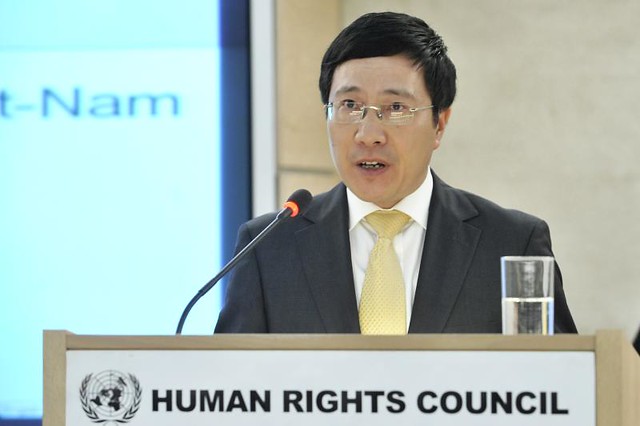 By Ernie Bower
By Ernie BowerPham Binh Minh, who was appointed foreign minister of Vietnam last week, addresses the Human Rights Council in Geneva earlier this year. United Nations photograph in the public domain.
Incumbent minister of defense General Phung Quang Thanh, 63, received the highest vote total in the National Assembly with a resounding 97.4 percent. Support for General Thanh underlines an institutional deference to the armed forces and a national resolve to take a strong stand on sovereignty issues in disputes with China in the South China Sea. Advancing defense and security ties with the Association of Southeast Asian Nations (ASEAN) and enhancing those linkages with the United States will be priorities. Last week Vietnam announced groundbreaking on a U.S. naval research facility, the first new American military facility in Vietnam since the war.
Another theme is the National Assembly’s growing concern with Vietnam’s rising inflation and slowing economic growth. Legislators’ anxiety was on display in the confirmation of outgoing finance minister Vu Van Ninh, 56, as deputy prime minister with only 81.8 percent of the vote. This total was almost 10 percent lower than the next lowest candidate for deputy prime minister.
Ninh’s replacement at the Ministry of Finance, Vuong Dinh Hue, 54, received a strong 90.2 percent vote. As the former head of the Office of the State Audit, Hue is a no-nonsense leader, armed with facts and figures and a mandate to correct the inefficiencies of large state-owned enterprises, prevent another debacle like the near collapse of state-owned shipping giant Vinashin, and oversee economic adjustments to rein in inflation and stabilize the dong.
He will be joined in this effort by Nguyen Van Binh, 50, who was promoted from deputy governor to governor of the State Bank of Vietnam. Binh has made it clear that he will continue the government’s tight monetary policies, with reversing inflation his primary goal. The new economic team may adopt severe short-term measures such as price controls. Such anti-market steps will need to be watched carefully as they could eventually undercut Vietnam’s attractiveness as a destination for new investment.
Finally, the promotion of Pham Binh Minh, 52, from vice minister to foreign minister signals continuity in foreign affairs and national security strategy. Minh received 94 percent of the National Assembly’s votes. Minh is the son of Nguyen Co Thach, who served as foreign minister from 1980 to 1991 and was perceived to be an early leader in the support for rapprochement with the United States and economic reform. He inherited his father’s pragmatism and openness to the West.
Minh’s first posting in the Foreign Ministry was to the Vietnamese embassy in the United Kingdom. In 1999, he was appointed deputy permanent representative to the United Nations, and from 2001 to 2003, he served as deputy chief of mission in Vietnam’s embassy in Washington. All indications are that he will be a strong leader and advocate for continued deepening of ties with the United States.
As Dung and his new team begin to unveil their plans, they will be facing a challenging environment. The country’s defense posture will continue to focus on balancing a large and increasingly assertive China. Economically and financially, having plugged into the global trade and financial superstructure, Vietnam’s relatively small economy (gross domestic product is near $100 billion) and developing institutions will be severely challenged by threats of global recession. Linkages to global markets and strategic partners is clearly core to Vietnamese national security strategy, which makes understanding and implementing next generation trade pacts like the Transpacific Partnership an imperative. Finally, balancing security, defense, economic growth and the Party’s penchant for tight societal controls will require world-class diplomacy.
Ernest Z. Bower is Senior Advisor and Director of the Southeast Asia Program and Pacific Partners Initiative at CSIS.
Nguồn:-Vietnam’s Cabinet: Three Key Ministers Reveal Policy Directions (CSIS 7-8-11) -- Ernest Bower cho rằng ba người đáng chú ý trong nội các mới là Phùng Quang Thanh, Vương Đình Huệ và Phạm Bình Minh